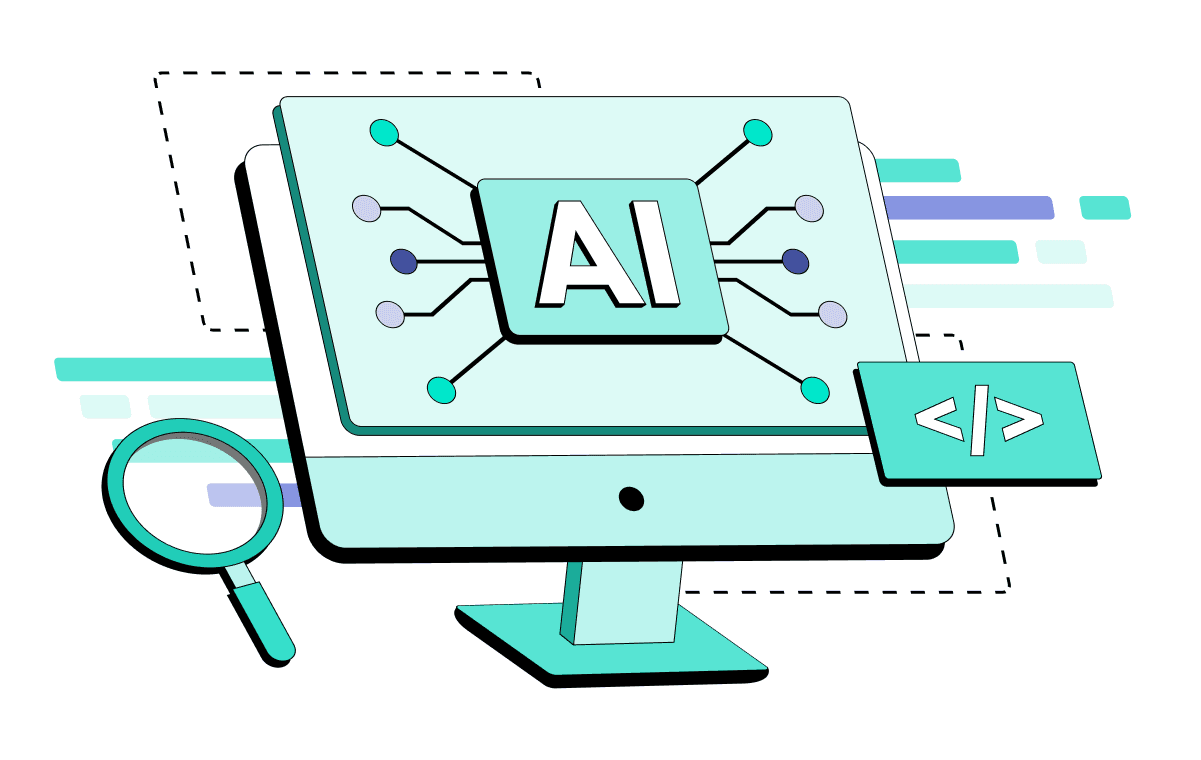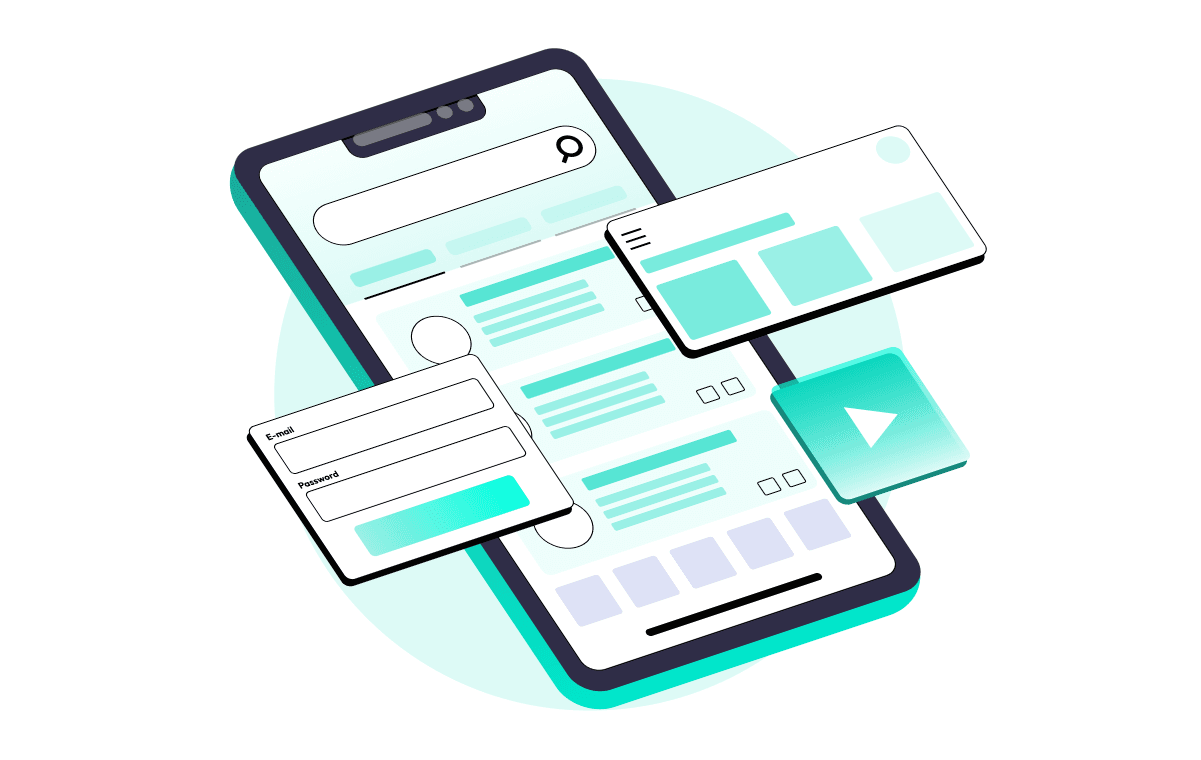Updated Oct 30, 2024 15 min read
How to Use AI in Testing: A Complete Guide
This article serves as a comprehensive guide on leveraging artificial intelligence (AI) in software testing, aiming to revolutionize the development cycle by enhancing efficiency and accuracy. It covers AI's transformative impact on automating routine tasks, predicting errors, and optimizing the testing process. Additionally, it discusses the challenges of integrating AI into testing processes and offers insights into AI-powered tools that can streamline these tasks.

Today, it is challenging to meet a person who has never heard of artificial intelligence (AI) and its impressive capabilities. In this article, we will look at how artificial intelligence can radically transform testing processes, from automating routine tasks to predicting potential errors before they become a severe problem. This comprehensive guide provides in-depth insights on how to use AI in software testing, harnessing the power of AI for software testing to optimize efficiency and accuracy.
AI In Software Testing
Artificial intelligence (AI) is a major technological breakthrough that mimics human learning and problem-solving processes using computer algorithms. AI can analyze volumes of information much faster than humans and is used in various fields — from automating routine work to predicting trends and solving complex problems. In the context of software testing, AI can revolutionize the process, making it faster, more efficient, and more accurate.
The Forbes article discusses how AI is revolutionizing automation testing in quality assurance by making processes faster and more efficient. Before AI, testing was a mix of manual and automated tasks that were time-consuming and costly. AI enables complete testing automation, learning from repeated tasks to improve processes over time. Benefits include speed, learning capabilities, enhanced analytics, and optimization post-tests. However, challenges exist, such as difficulty training AI, potential biases in AI systems, and the possibility of bugs or errors.
Benefits Of AI For Software Testing
Artificial intelligence is transforming the modern software testing process, providing new opportunities previously unavailable. Here are the extended details of the benefits of AI in this area:
Speed and efficiency: AI increases testing speed by automating repetitive tasks such as regression testing. AI can quickly analyze code and run tests, reducing the time required for manual testing. It also provides a more stable and reliable testing process, as it minimizes errors that are usually caused by human factors.
Resource savings: Reducing the time and effort required for testing directly leads to resource savings. AI can execute test scenarios with great speed and accuracy, allowing resources to be allocated more efficiently and team efforts to focus on other tasks.
But is AI capable of such colossal results? Let's take a closer look at whether AI can replace the tester or is just an auxiliary tool.

Trust the professionals - choose us to test your project. Fill out the registration form for a quick start!
Implementing AI in Software Testing Processes
ChatGPT, created by OpenAI, is a powerful tool in manual testing based on advanced natural language processing technologies. Here's how you can use ChatGPT to improve manual testing efficiency:
Generation of test scenarios
ChatGPT can help develop test scripts for API requests. For example, if you need to test user authorization, ChatGPT can offer a series of steps to check token validity, system response to invalid input, etc.
Example: A tester is working on a new shopping cart feature in an online store. They can ask ChatGPT to formulate scripts to test user interactions with the cart, including adding items, updating quantities, and removing items.
Creating test data
Instead of using complex tools like Apache JMeter, ChatGPT can quickly generate test data. You can get variations of email addresses to test the site's registration feature.
Example: A tester needs to test an order form where each field has valid and invalid input conditions. They can ask ChatGPT to generate different input options for each field, including valid postal addresses and phone numbers.
Verification of texts
ChatGPT is effectively used to detect and correct errors in texts. Suppose, after updating the content on the website, you want to make sure there are no errors. ChatGPT can go through the text and point out potential problems.
Example: After adding a new product description to a site, a tester can use ChatGPT to check for errors. ChatGPT will check the text and highlight potential spelling, grammatical, or stylistic errors for correction.
Generation of pairs for paired testing
To understand how to use AI in testing, consider that ChatGPT can suggest an optimal set of test pairs that will reduce the number of tests required without losing coverage when determining which combinations of product properties should be tested.
Example: A tester prepares to test product configurations with different color and size options. They can ask ChatGPT to generate all possible valid color and size pairs to ensure complete testing coverage without redundant combinations.
Diagnostics and problem-solving
When an unexpected problem arises, ChatGPT can suggest a solution based on the description of the situation. For example, if testing reveals an inconsistent error, ChatGPT can help identify common causes of such errors and suggest potential fixes.
Example: When a tester encounters a recurring server error when sending requests, they can describe the scenario to ChatGPT and ask for advice on potential causes and methods to resolve the problem, with a list of possible steps for diagnosis and resolution.
ChatGPT can be used as a comprehensive tool that increases the efficiency of manual testing, allowing testers to focus on more strategic tasks and improving the overall quality of testing. Now, let's expand on examples of the use of AI in automated testing in more detail.
Automatic script generation
Modern AI-based test automation tools such as Testim and Katalon Studio use machine learning to analyze applications and generate complex test scenarios that reflect real-world user scenarios and business logic. Our intriguing article on how to automate testing of web applications offers valuable insights into streamlining your testing processes.
Example: A developer wants to test a new order processing API. They utilize Testim to create scripts automatically generated based on typical user interactions with the system, including various order parameters and their processing.
Test case optimization
Artificial intelligence can significantly improve testing efficiency by analyzing existing test data to identify the most impactful tests and eliminate redundant ones. Tools like Applitools use AI-based analytics to determine the optimal set of test cases. We offer a comprehensive guide on how to write a test case in software testing, designed to equip you with the knowledge and skills necessary for crafting effective test cases.
Example: A QA engineer is optimizing a set of tests for a mobile application. They employ Applitools to analyze previous test releases, identify low-priority test cases that rarely find bugs, and exclude them from the regular test suite to reduce testing time.
Self-healing capabilities
AI-based frameworks like Healenium have built-in tools to detect changes in web elements or locators and automatically update test scripts. This reduces the need to manually update the tests after each user interface or application structure update (read more about our user interface testing services).
Example: A developer changes the structure of a web page, causing automated tests to fail due to outdated locators. Instead of manually finding and updating locators, Healenium automatically detects these changes and offers updated locators, ensuring the continuity of automated testing.
We draw your attention to the need for particular caution when working with artificial intelligence technologies, especially for testers who do not have significant experience in this field. It is important to understand that AI is at the active development stage. Although its use is justified, its potential can be fully revealed only under the guidance of an experienced specialist. Exploring how to use AI in testing can significantly streamline the process, enhancing accuracy and efficiency in identifying and resolving software issues.
Leveraging AI for Software Testing
Artificial Intelligence has transformed the test automation industry, offering sophisticated tools that enhance efficiency and accuracy. Among the plethora of options, five AI-powered tools stand out for their innovative approach and robust capabilities, catering to the diverse needs of the testing community.

UiPath Test Suite
A frontrunner in Robotic Process Automation (RPA), UiPath Test Suite is a comprehensive solution integrating top-tier RPA with superior testing functionalities. It's designed for extensive scaling through preemptive testing and fosters collaboration across departments. The suite boasts an array of components, including Test Manager, Studio Pro, and Robots, all unified under a user-friendly interface.
Sofy.AI
Revolutionizing mobile app testing, Sofy.AI is a no-code, AI-driven platform capable of delivering quality automation across Android and iOS devices. Its uniqueness lies in the ability to conduct manual, automated, and RPA testing efficiently, condensing the testing lifecycle and bolstering productivity without code complexity.
Tricentis Tosca
Tricentis Tosca emerges as an enterprise-grade end-to-end solution for application testing. With innovative features like Vision AI for software testing and risk-based test optimization, it adeptly navigates complex UI environments. Its Vision AI employs deep neural networks and heuristics to create reliable, self-healing test automation, making it a powerful ally for accessing even the most challenging UI systems.
Functionize
Positioned as a versatile cloud-based platform, Functionize excels in functional and non-functional testing, including performance evaluation. It leverages AI and machine learning to expedite test creation and management. Employing natural language processing allows for the generation of functional tests in plain English, executing hundreds of tests across various browsers simultaneously.
Parasoft
Parasoft offers an automated test suite applicable across the entire software development lifecycle. Its recent integration of AI and ML for enhanced test automation aids in implementing static analysis, early bug detection, and compliance with multifaceted coding standards. By prioritizing critical design issues, it alleviates the burden on development teams and ensures that essential safety and security requirements are met.
Now that you've learned about these AI-powered testing tools capabilities and benefits, you can choose the best fit for your needs and maximize your testing efficiency.
Challenges of AI in Software Testing
The advent of artificial intelligence in software testing heralds a new era of advanced analytical capabilities and the potential for significant automation. However, the integration of such cutting-edge technology is not without its challenges. Let's delve into these complexities:
AI-powered testing tools mark a departure from traditional testing methods. The shift towards AI-centric controls can be unsettling, often offering limited options for customization. In the initial stages, AI applications may produce false positives or perform analyses that lack relevance, fostering doubts about their practicality. AI systems necessitate a period of adjustment and fine-tuning before they can start delivering consistent results.
The cost of adopting high-caliber AI testing tools can be prohibitive, particularly for smaller entities or emerging startups. These costs are not restricted to initial investments; they extend into continuous expenses for updates, skills training, and system maintenance, representing a recurring financial commitment.
Legacy systems, the backbone of many existing IT infrastructures, often don’t readily mesh with AI innovations. A lack of foresight in preparing these integrations can lead to increased costs and extended timelines. Ensuring that AI tools can be seamlessly integrated into the current technological ecosystem is crucial, necessitating a strategic approach to planning and execution.
AI testing tools require detailed configuration and fine-tuning to suit specific testing environments. This process involves setting up extensive test data, creating sophisticated algorithms for pattern recognition, and ensuring that the AI can adapt to changes in the software being tested. AI models need to be trained with a diverse data set to handle various test scenarios, which can be time-consuming and technically demanding.
The current workforce may lack the requisite proficiency in AI technologies to maximize their benefits in software testing. This skill gap demands strategic investments in education and the recruitment of specialists, further adding to the adoption costs.
The effectiveness of AI in testing is heavily contingent on the quality and volume of the underlying data. Subpar or scarce data sets can result in inadequately trained AI models, undermining the testing process. Creating robust data management systems and ensuring high data quality is critical for the successful application of AI for testing.
In conclusion, the promise of AI to enhance software testing is immense, yet it demands a holistic understanding of the associated challenges. An organization's ability to harness the power of AI while addressing these hurdles is key to realizing the full potential of this transformative technology.
Conclusions
In this article, we considered how artificial intelligence is becoming a tool in software testing, opening up new opportunities for specialists. We also highlighted the challenges in integrating artificial intelligence into testing processes, highlighting that each has a potential solution. In drawing your attention to the importance of the human factor, we emphasize that AI should be seen as an auxiliary tool that allows testers to do their work with greater accuracy and productivity, not as a replacement for their work. For further insights or inquiries, don't hesitate to contact us.
Comments
There are no comments yet. Be the first one to share your opinion!
For 8 years, we have helped more than 200+ companies to create a really high-quality product for the needs of customers.
- Quick Start
- Free Trial
- Top-Notch Technologies
- Hire One - Get A Full Team
Was this article helpful to you?
Looking for reliable Software Testing company?
Let's make a quality product! Tell us about your project, and we will prepare an individual solution.
FAQ
AI in software testing means using smart technologies like machine learning, understanding human language, and brain-like systems to make testing faster and more automatic. AI analyzes data from software tests, predicts outcomes, identifies defects more efficiently, and optimizes the testing cycle. It can recognize patterns, predict user behavior, and provide intelligent insights that guide software development and testing decision-making.
AI fundamentally transforms the testing process by automating complex tasks that traditionally require human intervention. For example, AI can automatically generate and optimize test cases, execute them quickly and precisely, and analyze the results to identify defects. It can also adapt to changes in the software, learning from previous test runs to improve over time. This results in a more dynamic and responsive testing strategy reduces the time to market and helps teams focus on more creative and complex test scenarios.
AI is not poised to replace human testers but to augment their capabilities. While AI can automate repetitive and data-intensive tasks, human testers are crucial for crafting testing strategies, understanding the nuances of user experience, and making complex judgment calls. The interpretive and creative aspects of testing are beyond the scope of current AI capabilities. Hence, human oversight is essential for ensuring that AI tools effectively align with the software testing objectives.
The market offers a range of AI-powered testing tools, each with unique features tailored to different testing needs. For instance, UiPath Test Suite is renowned for its RPA capabilities, while Sofy.AI provides a no-code platform for mobile app testing. Tricentis Tosca offers risk-based test optimization, and Functionize specializes in using NLP for test creation. Parasoft brings AI to the realm of static analysis for code. These tools are at the forefront of incorporating AI into the testing ecosystem, helping teams streamline testing processes and improve software quality.
At Luxe Quality, we integrate AI-driven tools into our testing processes to enhance accuracy, efficiency, and coverage. Our team utilizes AI for predictive analytics, test case generation, and maintenance, allowing us to detect issues earlier and reduce testing time. By combining human expertise with AI capabilities, we ensure that our clients receive high-quality software testing tailored to their specific needs while maintaining flexibility for continuous improvements.




